Ulma-e-Deoband and My Bit for Change: Two websites producing Wahhabi and Deobandi Jihadists in the West
Related posts: Pakistan’s Most Wanted Terrorists: Leaders, inciters and executioners
Names and pictures of Wahhabi Deobandi terrorists responsible for global terrorism since 9/11
In the last few years, there’s an increasing number of radicalized Muslim youth who are willing to participate in Jihadist violence and terrorism not only in Muslim countries but also in the West.
The article in this link provides a Pakistani check-list of how likely is it that a Muslim would turn into a Takfiri fanatic or terrorist. The list is equally applicable to Muslims of non-Pakistani backgrounds: https://lubpak.com/archives/224278
Most vulnerable are Sunni Muslims, particularly those from Salafi (Wahhabi) or Deobandi (semi-Wahhabi) backgrounds. There’s almost no Sunni Sufi, Shia or Ahmadi involved in terrorism in the West.
There are two types of websites involved in the Wahhabi-Deobandi brainwashing.
1. Blatant Jihadist websites (e.g. Ulma-e-Deoband, Haq Char Yar, Al Nusra Front etc)
2. Subtle Jihadist websites (e.g. My Bit for Change, Zakir Naik’s Peace TV website, Farhat Hashmi’s Al Huda, Jamaat-e-Islami, muslimmatters.org etc)
In this post, we are providing an example of a blatant Jihadi hate site (Ulma-e-Deoband facebook page) and a subtle or refined Jihadi hate site (My Bit for Change MBFC facebook and website). My Bit for Change has 40,000 followers on facebook while Ulma-e-Deoband has more than 140,000 followers. In a nutshell, My Bit for Change is more subtle and refined, paving way for the next step in the ladder, i.e., Ulma-e-Deoband and other blatant Jihadi websites.
The recent case of two Wahhabi militants involved in the horrific murder of Lee Rigby in Woolwich (London) has raised serious questions about how the men were radicalised. Evidence has now emerged that the suspects had been keeping ‘in touch’ with the radical preacher Omar Bakri who was deported from the UK but has continued to use the internet as a vehicle to drive home his ‘extremist’ views.
In Britain, the fight against online cyber extremism has become a key priority as the Strategic Defence and Security Review in 2010 highlighted. Moreover, the home secretary Theresa May recently told the BBC’s Andrew Marr show on Sunday that a new workforce would be set up to examine online cyber extremism because as in her words ‘cyber jihad’ was the ‘new’ threat the UK faced.
Indeed, the case of people being radicalised via the internet is not limited to Woolwich, as the case of Roshonara Choudhry showed. She stabbed the MP Stephen Timms in 2010 and admitted in her trial that she had been radicalised by the online sermons of the now deceased Anwar al Alawki.
Furthermore, the three men convicted of terrorism related offences in Birmingham in February 2013 showed how easily people can be radicalised through the internet by extremist websites and online preachers of ‘hate’. For example, evidence in the trial of the three men from Birmingham showed that they were frequent visitors to online extremist sites where they were listening to hate lectures and sermons.
This type of radicalisation has allowed preachers of hate to use the internet to groom and radicalise young men like Michael Adebolajo to commit acts of violence and terrorism. Therefore, examples of those who have been radicalised via the internet are not limited and isolated to the Woolwich case and include cases such as David Copeland, who used online material to make nail bombs.
Recruiters are increasingly using websites, online chat rooms and cyber cafes, as a means to enlist the support from the most weak and vulnerable; namely young people. These chat rooms help build and maintain ideological partnerships and act as a recruitment model for radicalising the youth. The recent events in the Middle East show the murky lines between participation in social media and physical demonstrations.
Thus, the internet has become a safe haven for many terrorists and ‘hate’ preachers who can remain anonymous, do not need to directly enter the UK to radicalise young people. For example, the online terrorist Younis Tsouli, who used the name Irhaby (terrorist) 007 to hide his details, ran sophisticated extremist material online, promoting the cause for terrorist groups like al Qaeda and creating terrorist cells at great distances, such as Pakistan, Canada and France. In 2007, he was convicted in the UK for inciting terror through the use of the internet.
Al Qaeda’s most prominent media arm, the As-Sahab Institute for Media Productions, has had a leading role in recruitment of a wider audience. Alongside its online magazine Inspire, As-Sahab releases more than 58 videos every six days according to the Intel Centre.
What we know from the case of Woolwich, Roshonara Choudhry, the Birmingham 3 and others, is that young people are now going on the internet to find answers to questions they cannot dare to ask in mosques. The internet allows them that space to air their grievances, particularly those related to foreign policy, and provides extremist preachers the opportunity to spread their online message of hate. The UK government must do more to tackle online extremism. Otherwise more cases like Woolwich may arise.
Sources: http://tribune.com.pk/story/558048/analysis-cyber-extremists-radicalisation/
Examples of hate from the Ulma-e-Deoband and My Bit for Change:
Common themes and tactics:
1. Support for Wahhabi Jihadi terrorists fighting Assad regime in Syria;
2. Support for Turkey’s Islamist dictator Erodogan;
3. Silence on Wahhabi-Deobandi atrocities by the Taliban, Sipah Sahaba (ASWJ-LeJ), Al Qaeda against innocent Sunni, Shia, Ahmadi, Christian and other victims;
4. Selective publishing of pictures and events from Palestine, Burma (Myanmar) Syria, Pakistan etc to incite Wahhabi Deobandi militants to violence against Christians, Jews and Alawites (Shias).
5. Support for convicted Wahhabi Deobandi terrorist Aafia Siddiqi;
6. Out of context quotations from the Quran and Hadith to promote Jihad against “oppressors” in Afghanistan, Iraq, Palestine, Syria etc (read Christians, Jews, Shias etc)


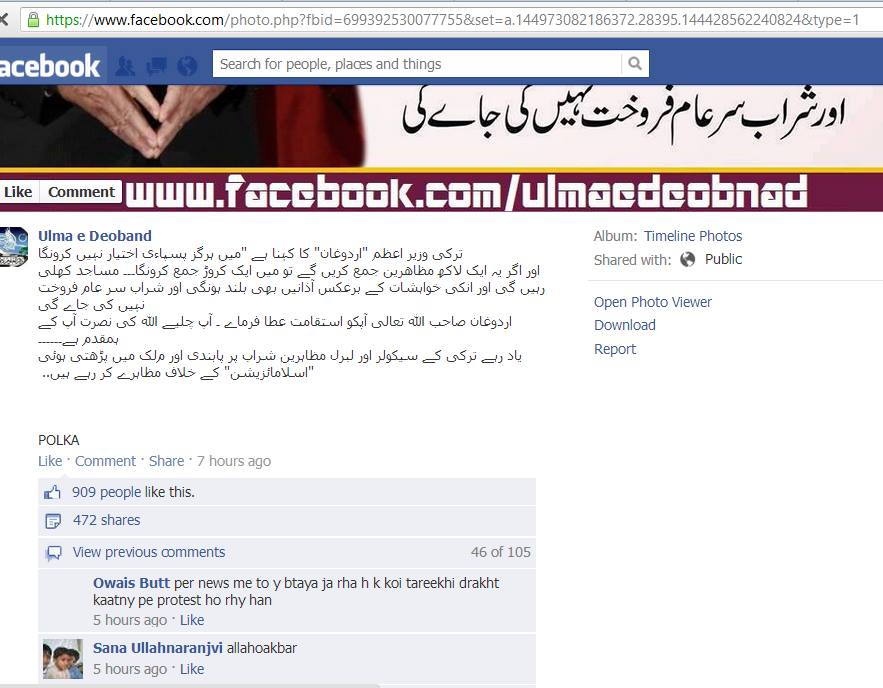
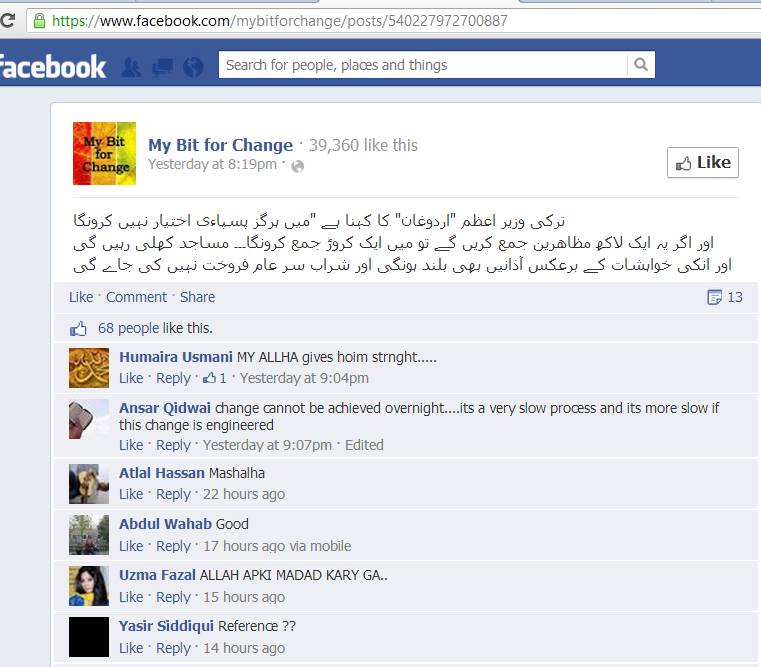

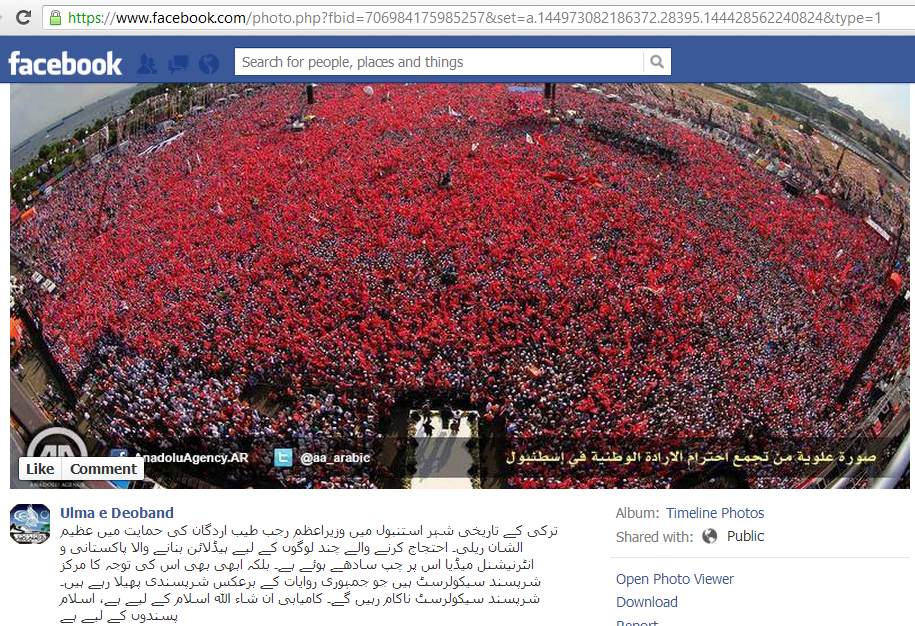
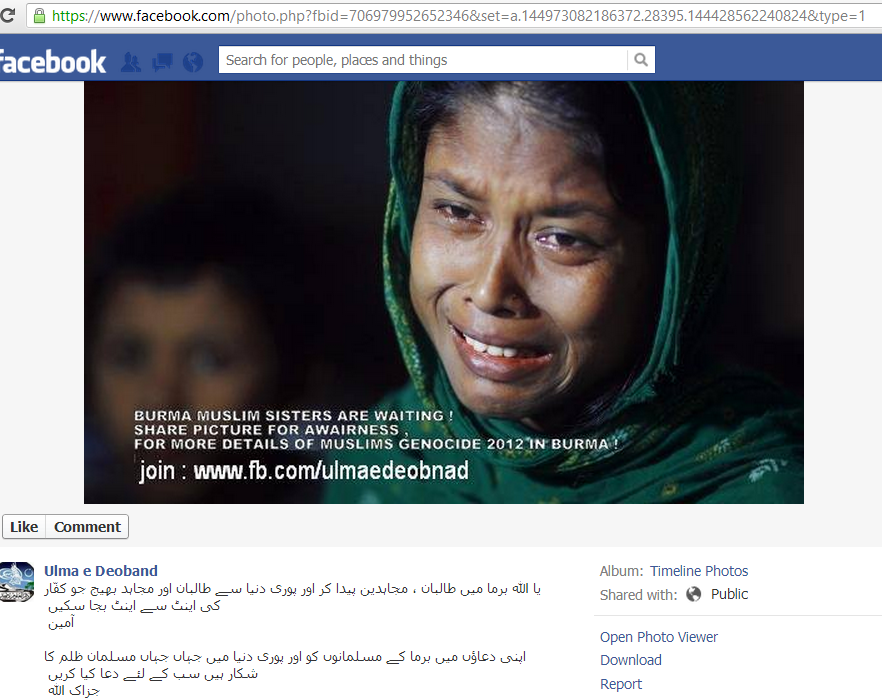
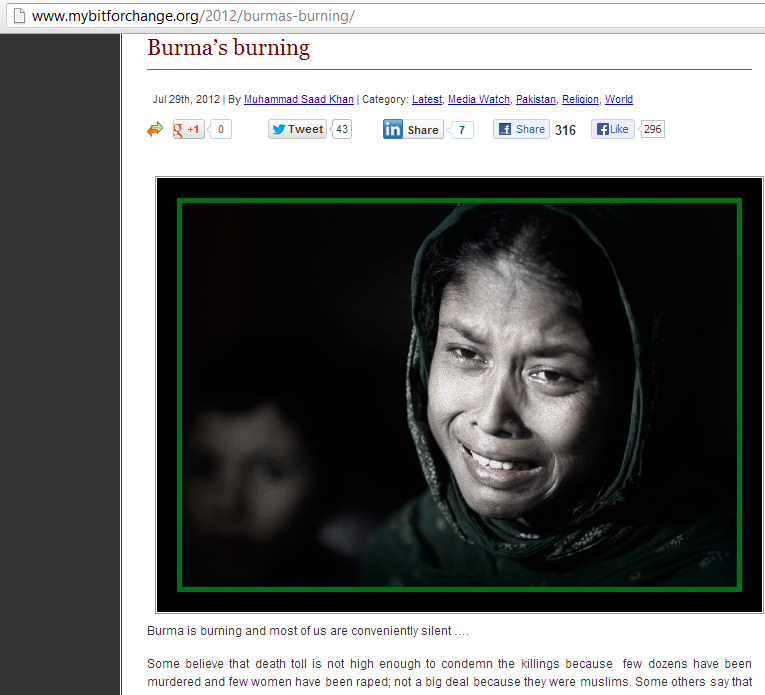
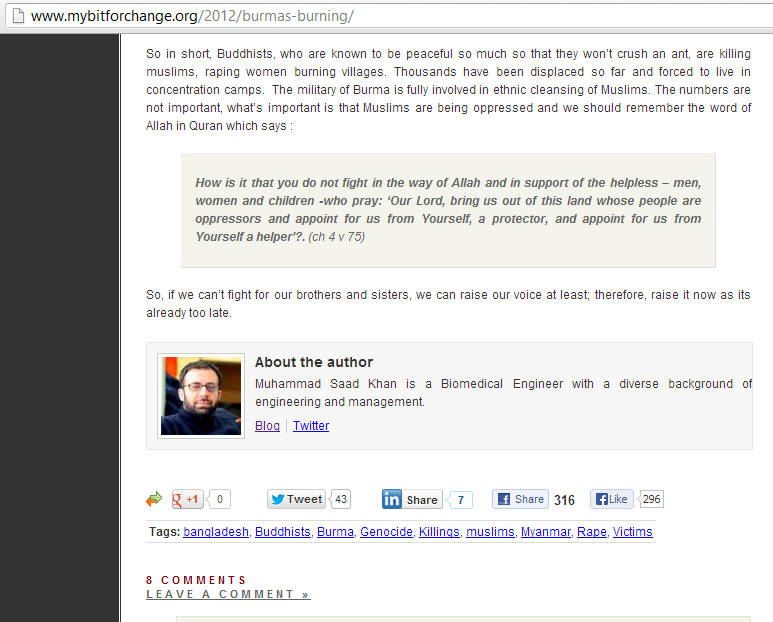
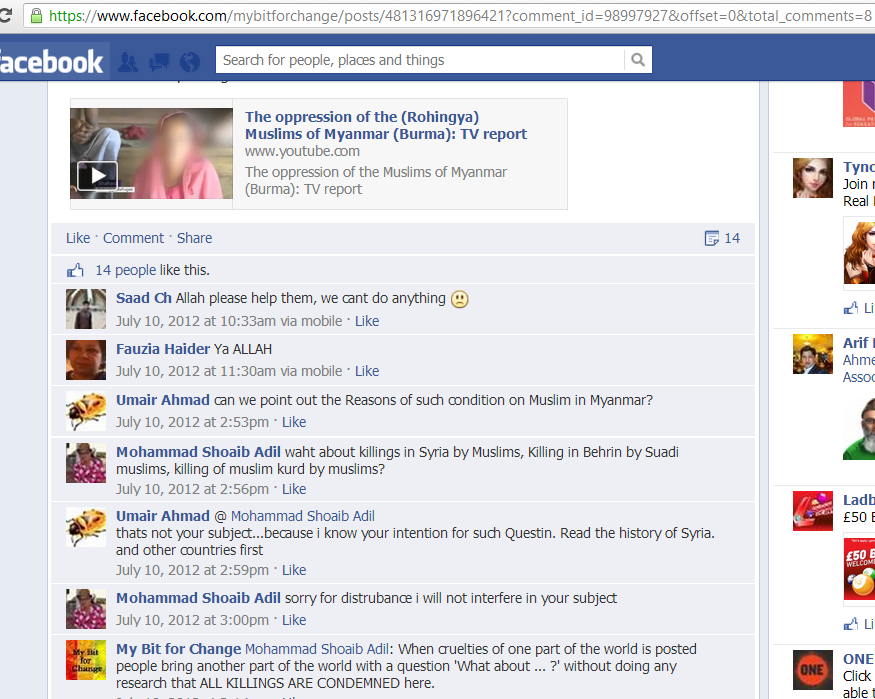
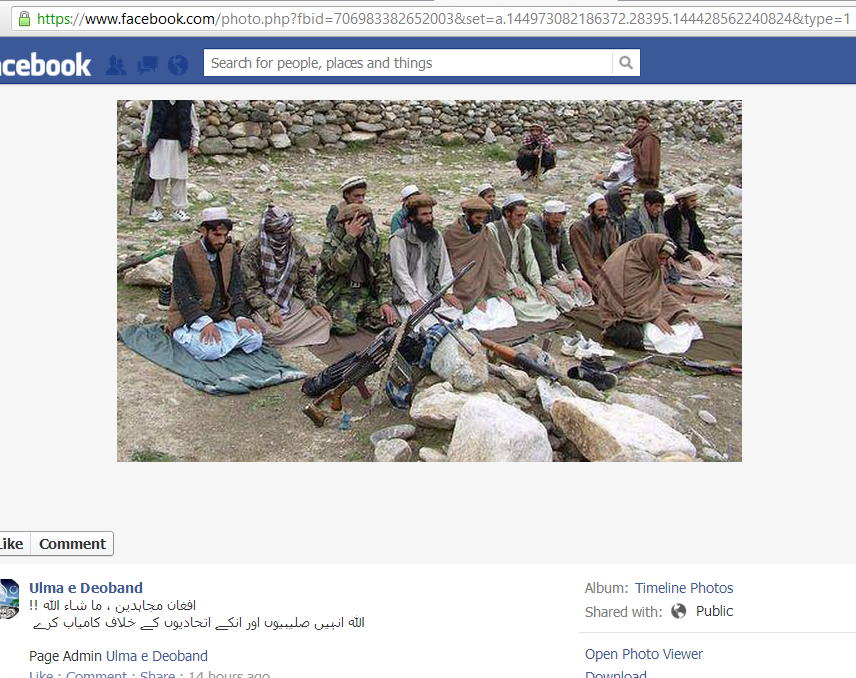
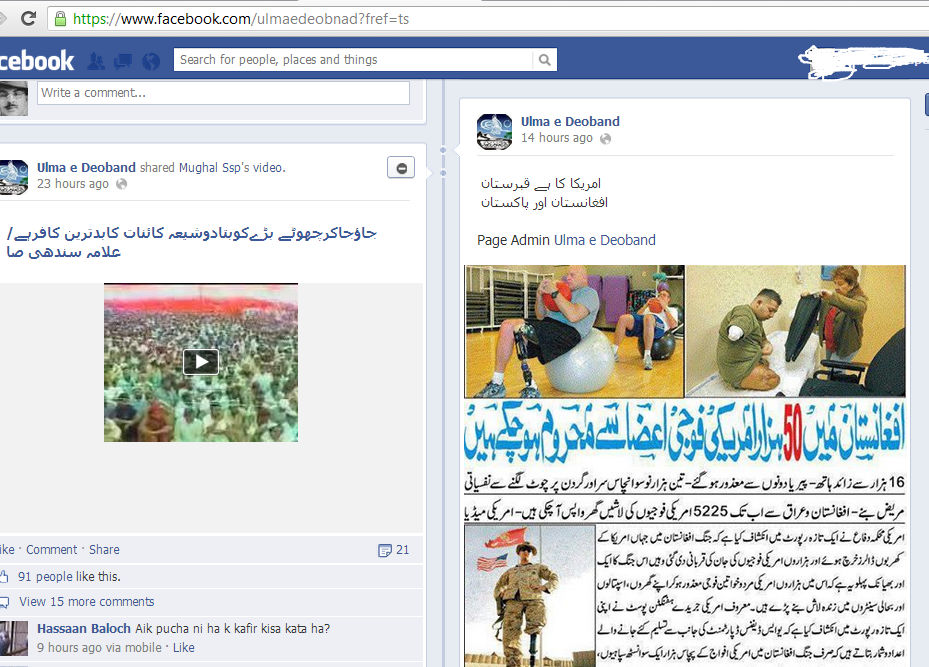
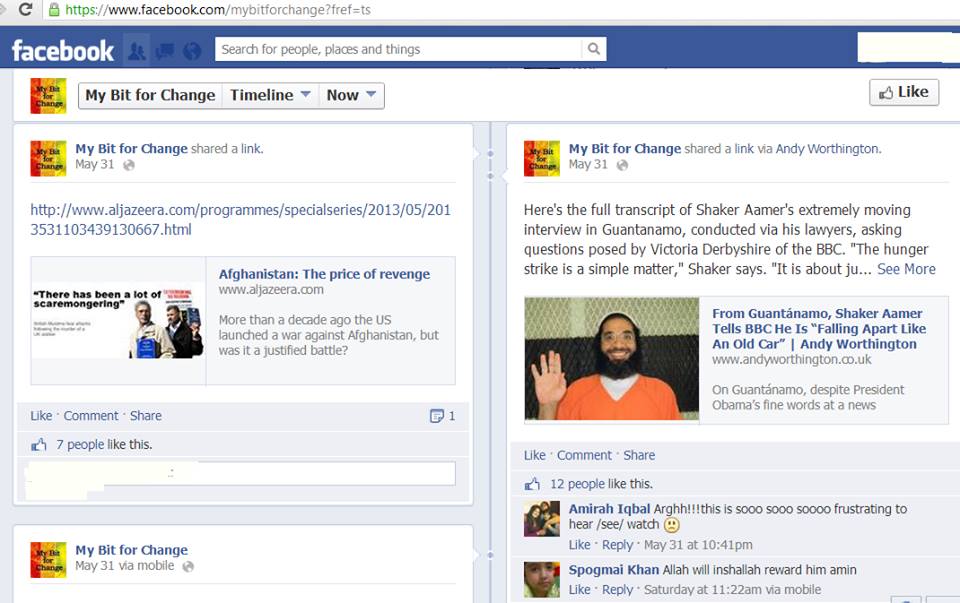
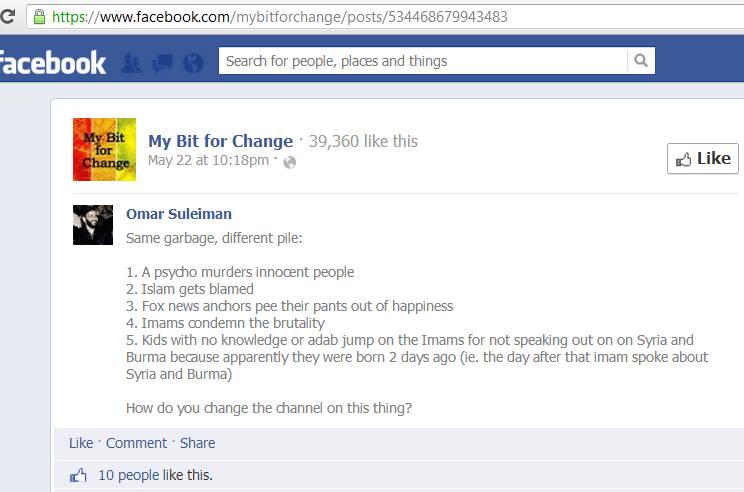
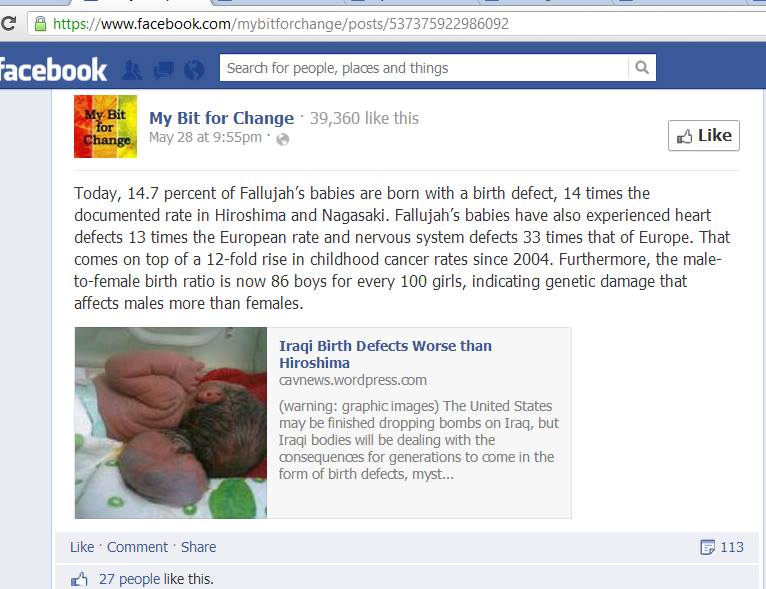
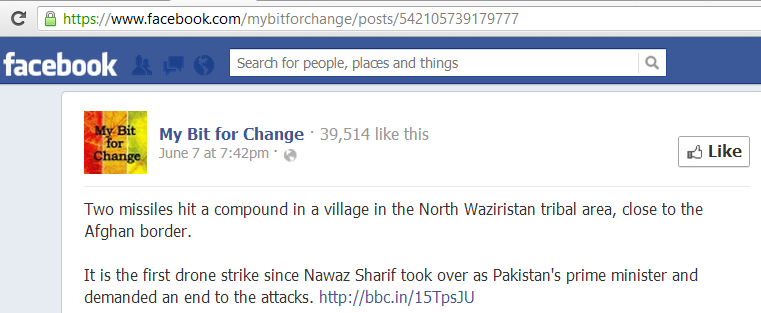
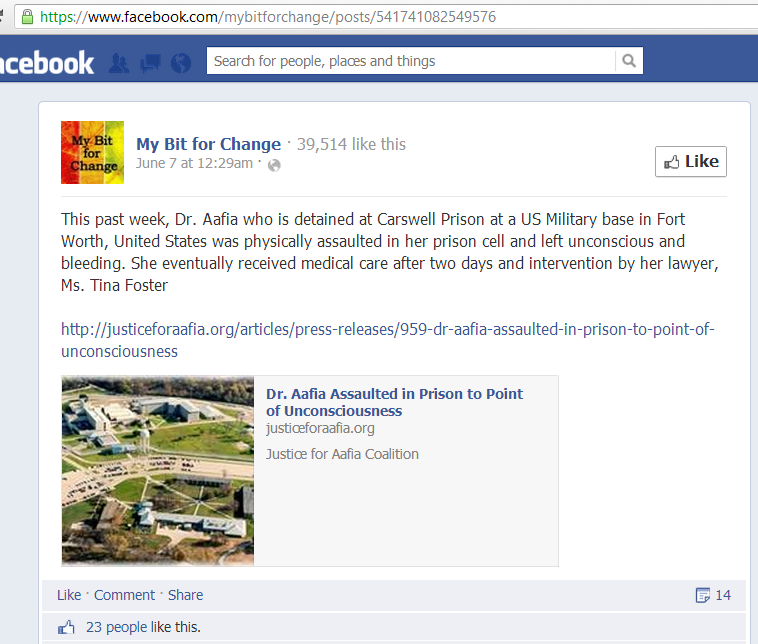
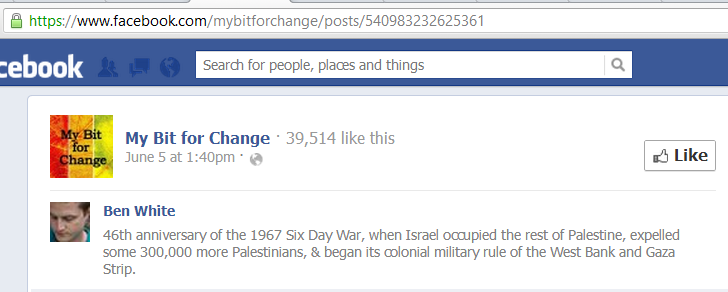

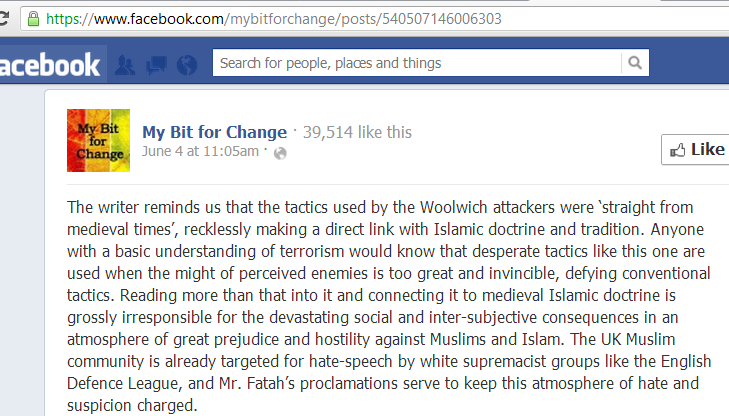
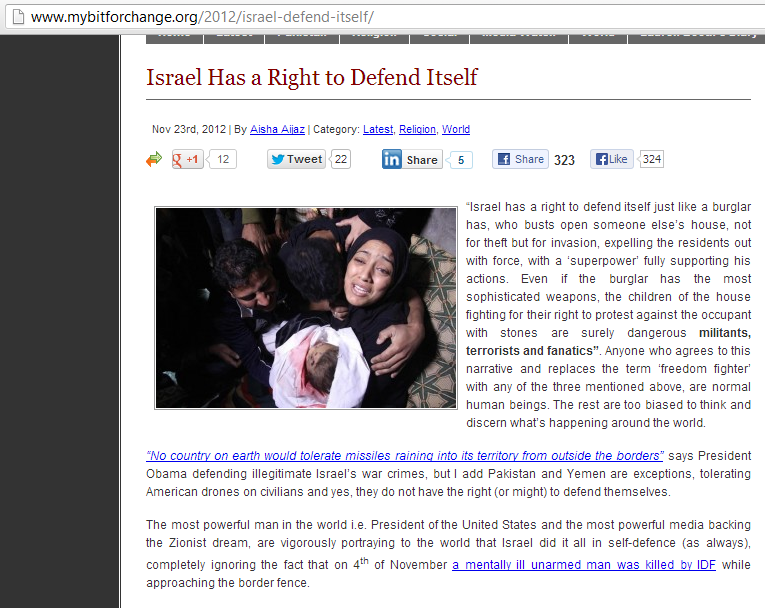
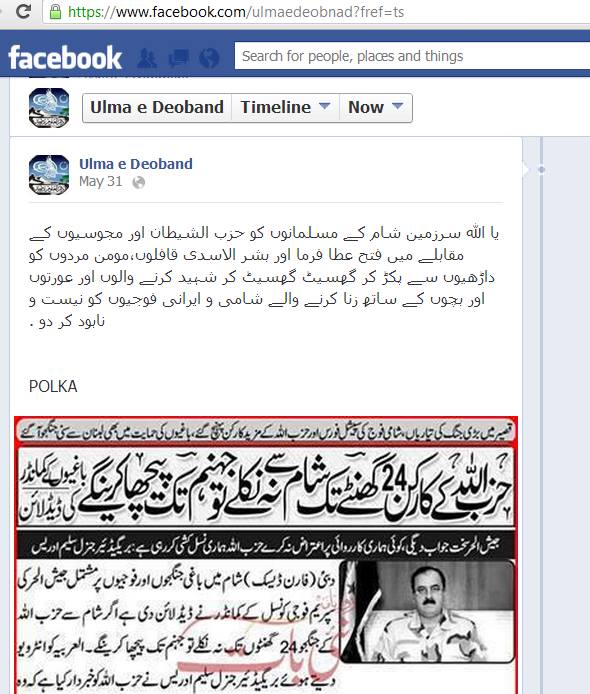
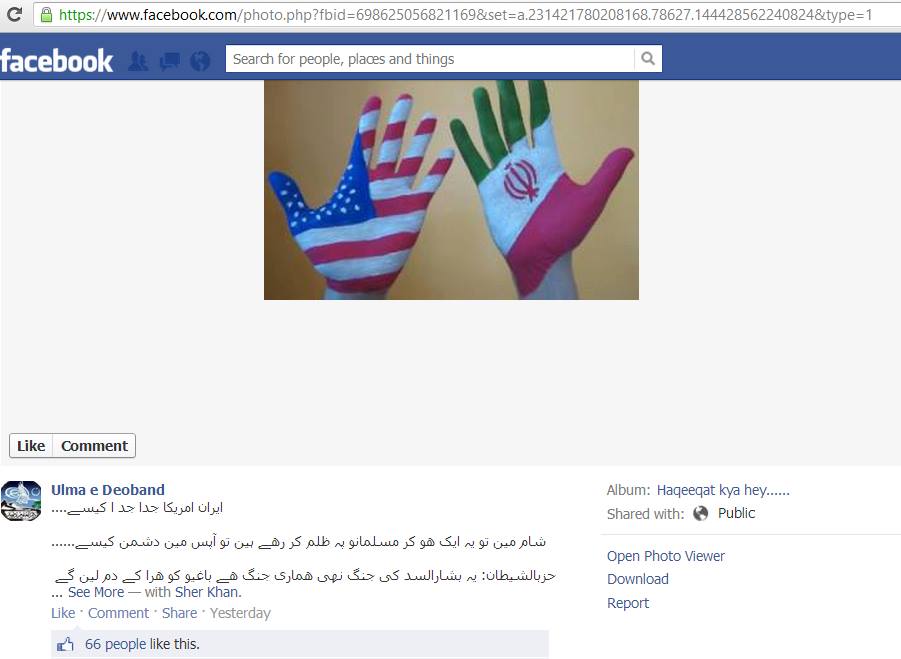
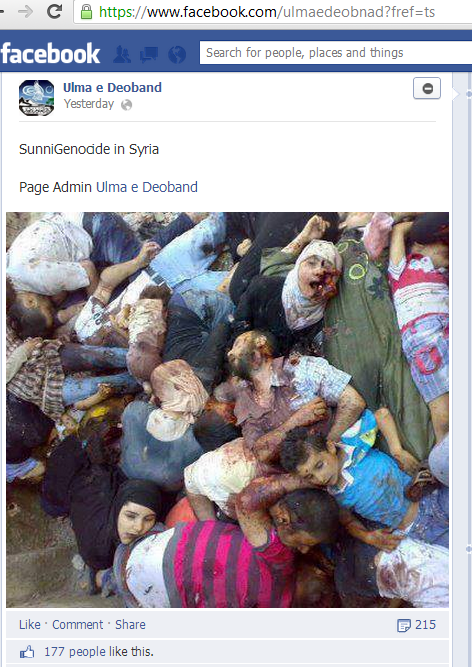
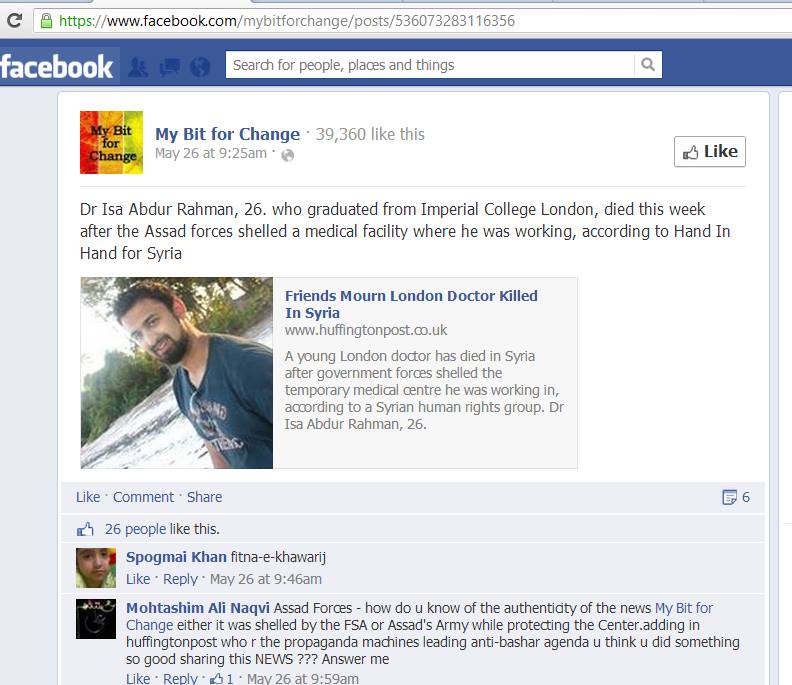
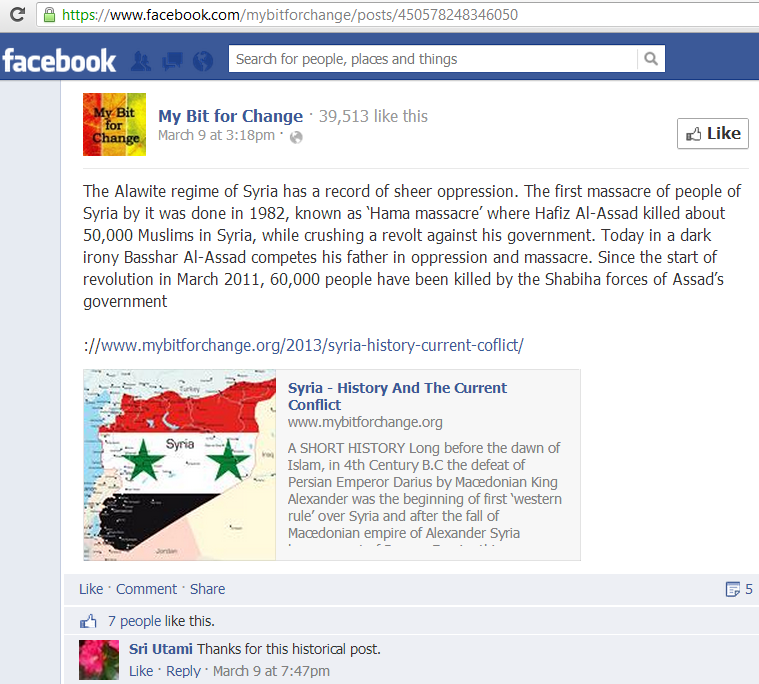
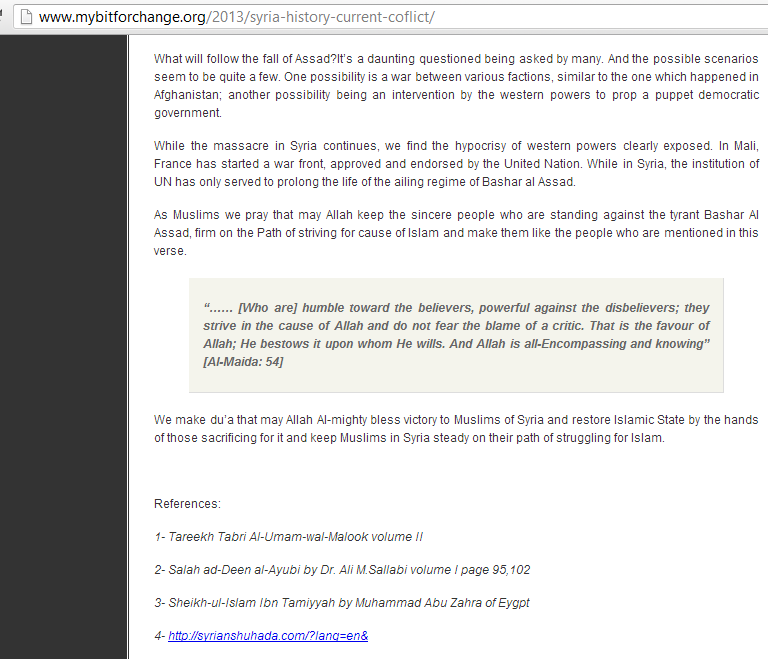
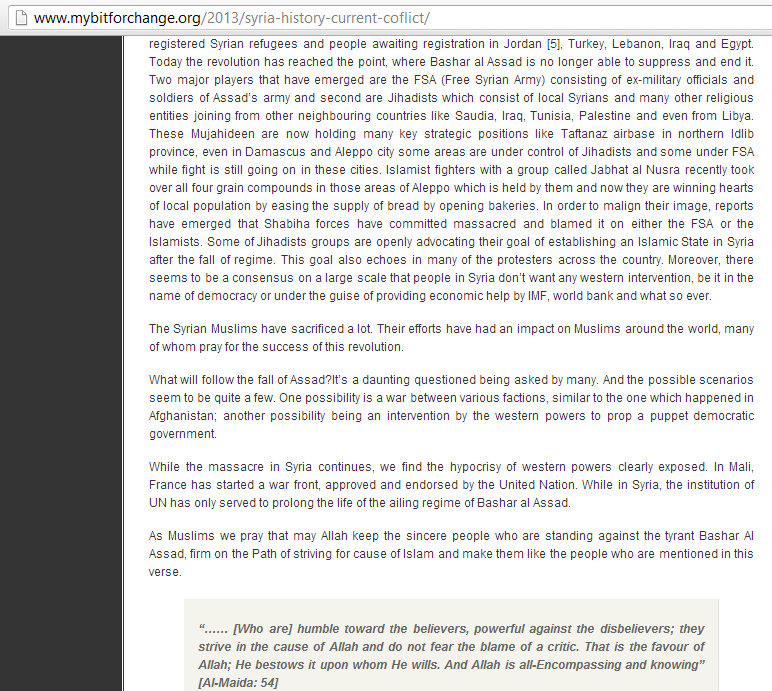
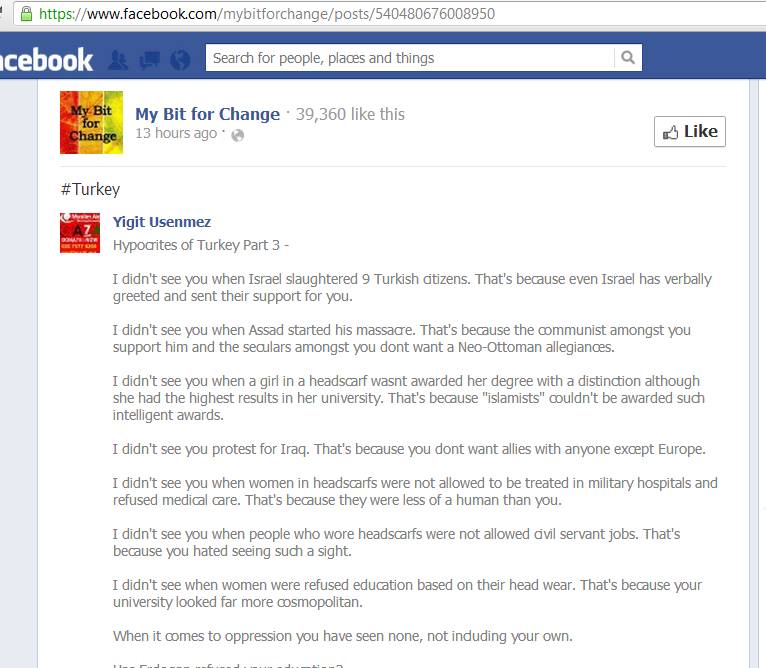
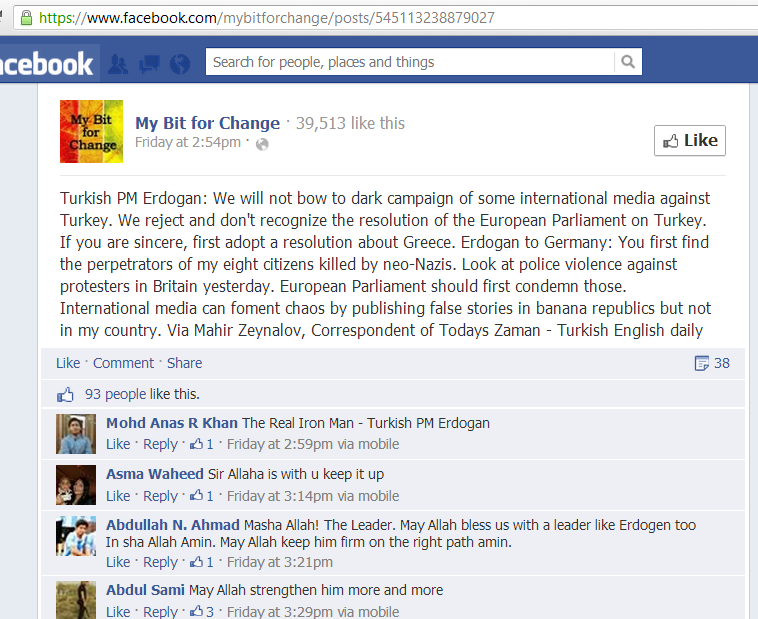
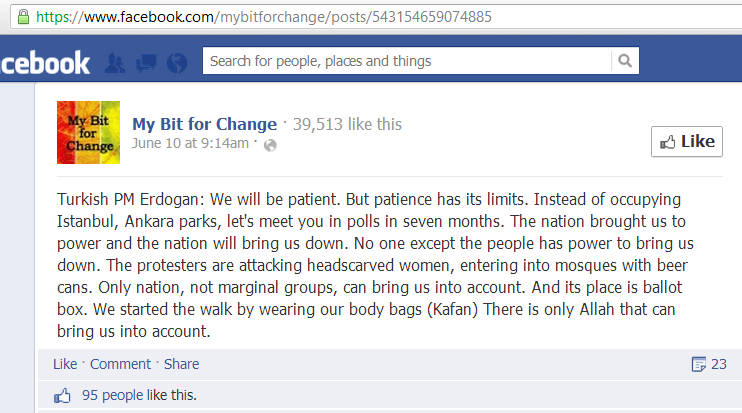
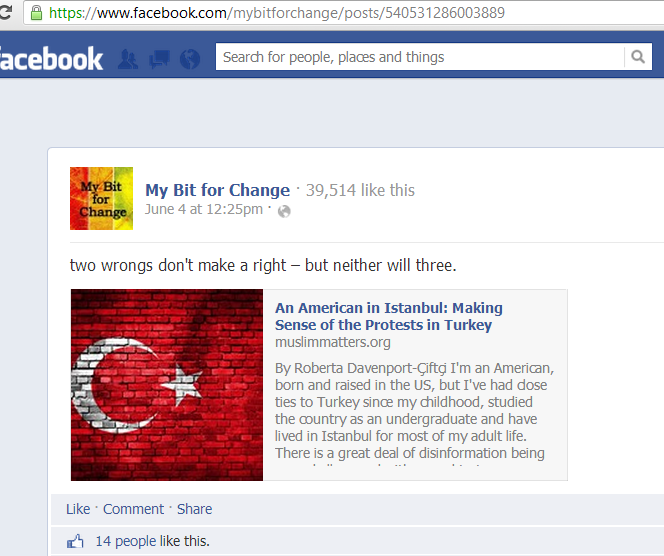
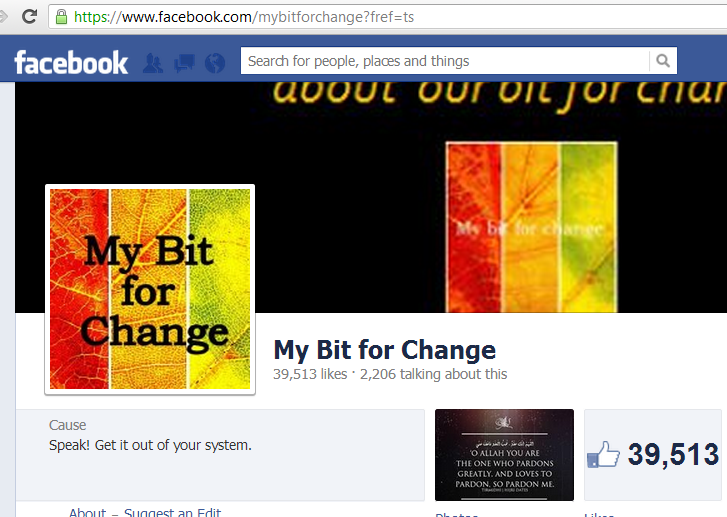
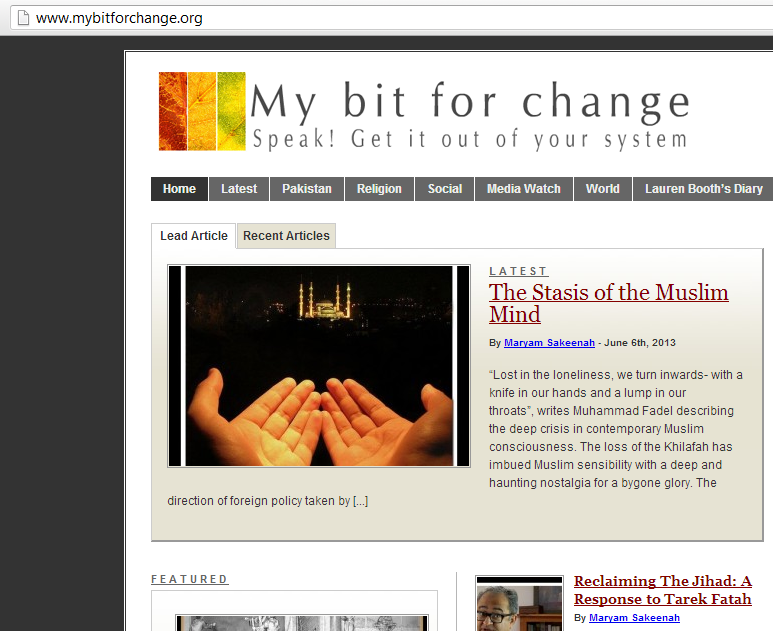
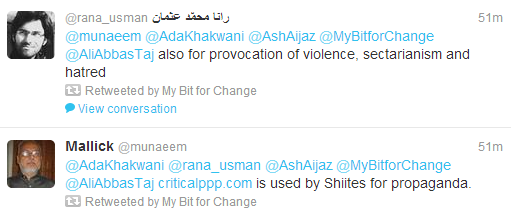
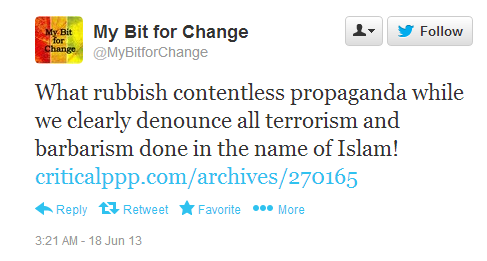
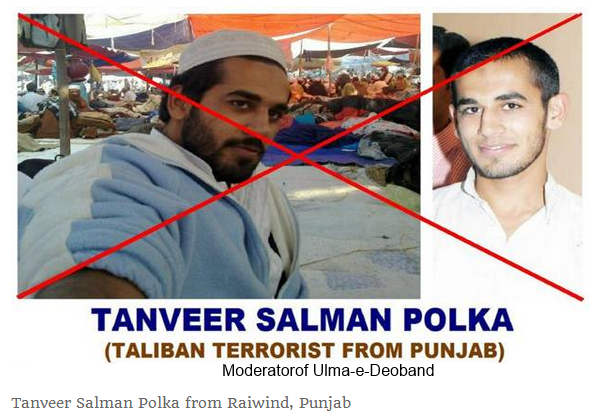
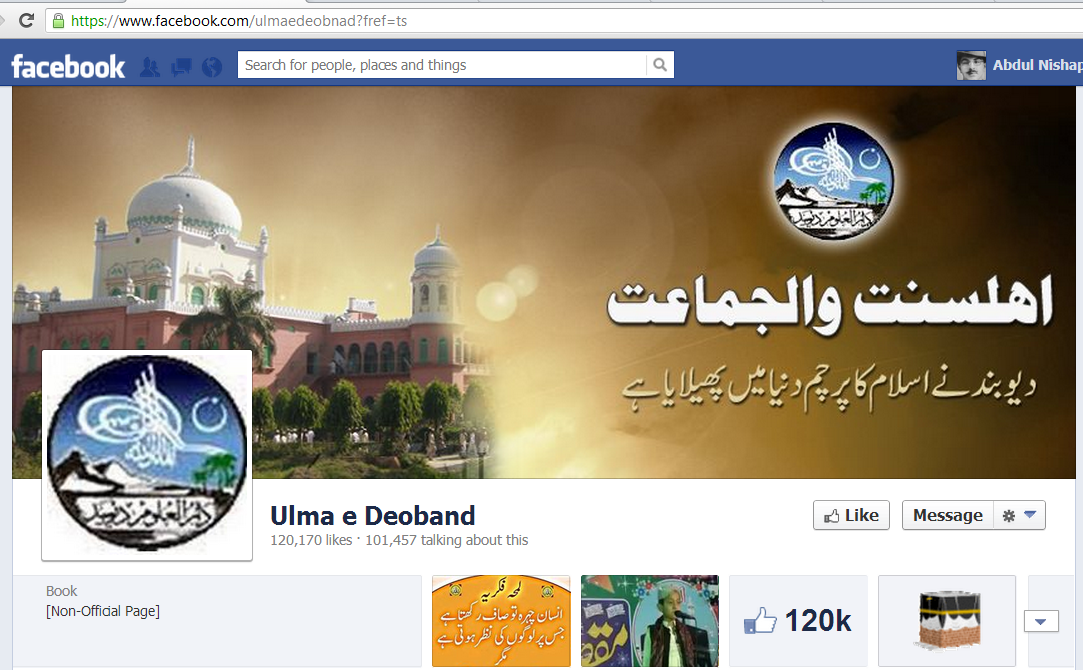

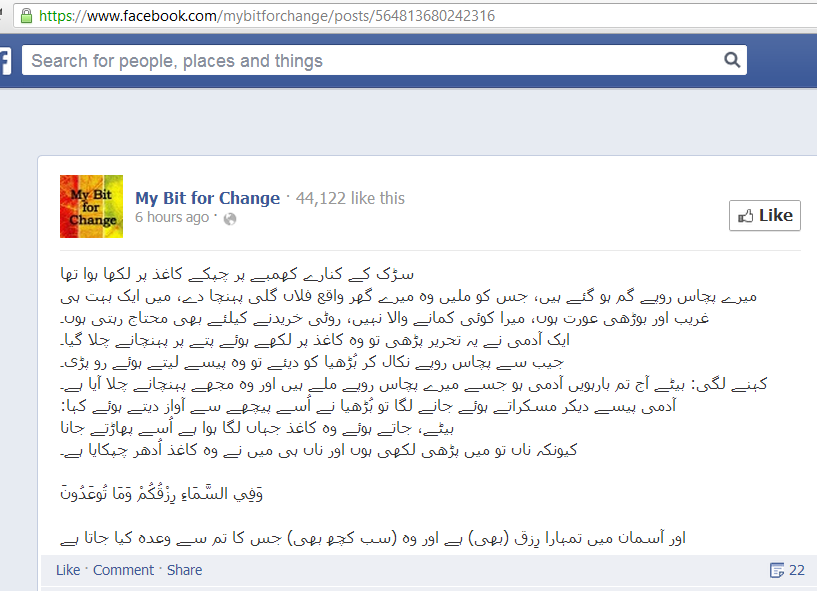
I think this is in the wrong section, its supposed to be in humour and satire.
Tanveer Salman Polka Deobandi is a terrorist of Lashkar-e-Jhangvi ASWJ.
He incites Takfiri Deobandi terrorists to violence against Ahmadis, Shias and Sunni Barelvis.
My Bit for Change (also known as My Bit for Al Qaeda) is known for subtle brainwashing in Europe and North America.
If there is an act of terrorism (eg attack by Takfiri Deobandi terrorists of ASWJ/ LeJ on innocent Sunni and Shia girl students in Quetta university and Bolan Hospital, or attack in Birmingham on 3 Sunnis by a Somali Wahhabi fanatic, or murder of 60 Shias in a village in Syria by FSA Wahhabi terrorists, or organ eating Nusra Wahhabi Jihadis in Syria), Aisha Aijaz of MBFC completely wipes out those incidents, and instead continues to brainwash innocent Sunnis’ minds with selective, Jihadist anti-West propaganda.
Thank you, Mr. Hafsi, for well researched article.
Interestingly, several posts in the two web sites are quite similar in content and graphics. Some of them are exact copies, appear to be Urdu to English translation or vice versa.
No wonder an increasing number of Muslims in the West are being brainwashed by such hate sites.
What a rubbish post by criticalapp.com !!
I mean of all the incredibly bad websites out there you think mybitforchange is bad?!?! WHAT?!?!? I have read all those “moderate” websites like expresstribune.com and they are the ones which are utterly biased and now so is criticalapp.com
To me http://www.mybitforchange.org is one of the websites around! And, i for one, respect them for standing up for what is right & voicing a voice for the oppressed like the muslims being persecuted in burma & Dr. Aafia!
On the other hand, such rubbish sites like criticalapp.com are the ones which are spreading hatred & misconceptions against people who mean good NOT harm! Pathetic post!
LUP/Critical PPP, thanks for bringing this matter to our attention. I live in Middlesex and interact with many Moslems and always disagreed with the media perceptions that they are all the same. For instance, the Imami/Ismaili Shias and the Sufi venerating Sunnis seemed much better adjusted and hard working Britishers. On the other hand, I also had some very unpleasant experiences with Wahabis/Salafis. From your site, I learnt that the closest South Asian version for this sect is Takfiri Deobandis. These Salafist groups tend to be very intolerant, prone to violence and generally less productive members of society.
They hate Shias and Sunnis even more than they hate Jews and Christains. Many of them hold medieval Caliphs like Yazeed in greater veneration than even their own Prophet Mohammad. One can simply never reason with this group as they get abusive and start to shout down any arguements that expose them.
An easy method to spot Salafist apologists like the Two Bits type is in their advocacy method. Two Bit types tend to be vague in condemning extremism but mantain their entire focus on selective causes like Burma etc. They will always say silent about the treatment of Shias and Ahmadis in muslim countries. If the Two Bit apologists are listening, let me inform them that they are being monitored along with other more explicit hate sites. In intelligence circles, its not just blatant hate groups like Neo Nazi and Al Qaeda types that are being monitored. Even the more sutble and vague apologists like Two Bits types are also being closedy examined.
LUP/Critical PPP, thanks for bringing this matter to our attention. I live in Middlesex and interact with many Moslems and always disagreed with the media perceptions that they are all the same. For instance, the Imami/Ismaili Shias and the Sufi venerating Sunnis seemed much better adjusted and hard working Britishers. On the other hand, I also had some very unpleasant experiences with Wahabis/Salafis. From your site, I learnt that the closest South Asian version for this sect is Takfiri Deobandis. These Salafist groups tend to be very intolerant, prone to violence and generally less productive members of society.
They hate Shias and Sunnis even more than they hate Jews and Christains. Many of them hold medieval Caliphs like Yazeed in greater veneration than their own Prophet Mohammad. One can simply never reason with this group as they get abusive and start to shout down any arguements that expose them.
An easy method to spot Salafist apologists like the Two Bits type is in their advocacy method. Two Bit types tend to be vague in condemning extremism but mantain their entire focus on selective causes like Burma etc. They will always say silent about the treatment of Shias and Ahmadis in muslim countries. If the Two Bit apologists are listening, let me inform them that they are being monitored along with other more explicit hate sites. My friends in the intelligence circles don’t only study blatant hate groups like Neo Nazi and Al Qaeda types. The more sutble and vague apologists like Two Bits types are also being closedy examined.
What a rubbish post by criticalapp.com !!
I mean of all the incredibly bad websites out there you think mybitforchange is bad?!?! WHAT?!?!? I have read all those “moderate” websites like expresstribune.com and they are the ones which are utterly biased and now so is criticalapp.com
To me http://www.mybitforchange.org is one of the BEST websites around! And, I for one, respect them for standing up for what is right & voicing a voice for the oppressed like the muslims being persecuted in burma & Dr. Aafia!
On the other hand, such rubbish sites like criticalapp.com are the ones which are spreading hatred & misconceptions against people who mean good NOT harm! Pathetic post!
Softened tone of jihad propaganda conveys the same bitter message
By Colin Freeman
The voice of Fallujah’s insurgency lives on. Once the loudest and most terrifying in Iraq, it now speaks through posters and flyers plastered on mosques and street corners. Yet, while the blood-curdling diktats baying for jihad have largely disappeared, there is nothing to say that the more subtle approach of the new messages is any less effective.
Documents translated by the US military and seen by the Sunday Telegraph reveal a patient, pleading tone, politely advising locals about their duties as jihadists, in the same manner as a local mayor might chide people about non-payment of council tax.
“To the residents of our respectful family,” reads one flyer. “Where is your support for the Mujahideen? God has spoken to his believers and told them to fight. It is your legal duty to do so.”
Another adopts the style of a frustrated headmistress rebuking recalcitrant pupils. “Today we will talk about the children,” it says. “We have asked many times for them not to be close to the coalition forces, but at the same time we have seen them accumulate around their vehicles. This has caused us to abort many of our operations.”
It goes on to accuse the Americans of enticing children with toys and sweets to create a human shield around them. “They just want to make your children as armour for themselves.”
For American and Iraqi forces in Fallujah, the fact that the insurgents are resorting to such conspiracy theories is taken as an encouraging sign of weakness.
“The war here is as much about propaganda as fighting face to face, but I do not think the people here believe such messages,” said Col Raad Abbas. “They see us getting hurt along with them and they know that the killings are not of our making.”
Major Mike Motley is less sure. “My fear is that some of the people here do believe in conspiracy theories,” he said. “Both US and Iraqi forces are extremely vulnerable to insurgent propaganda.”
http://www.telegraph.co.uk/news/worldnews/middleeast/iraq/1515246/Softened-tone-of-jihad-propaganda-conveys-the-same-bitter-message.html
Al Qaeda and the various other associated groups that form what we will here labelthe Global Jihadist Movement (GJM), have, as is true of any terrorist organization,a pronounced need for public communication. Violence in and of itself, despite themagnitude and spectacular levels it can reach, is never sufficient to achieve the ulti-mate aims of terrorists. Violence has as its purpose destroying that which it considersthe enemy and spreading fear in the affected population. However, at the same timeit is a mechanism that permits transmission of content. On said occasions this mess-age is transmitted via symbols used in communique´s or through the interpretationthe population will ‘‘read into’’ the attacks themselves
http://www.academia.edu/2324643/Analysis_and_evolution_of_the_global_jihadist_movement_propaganda
Officials: Boston bomb suspect read jihadist sites
The Associated Press ^ | April 23, 2013 | Denise Lavoie and Eileen Sullivan
Posted on 23/4/2013 22:10:48 by 2ndDivisionVet
Boston Marathon bombing suspect Tamerlan Tsarnaev was an ardent reader of jihadist websites and extremist propaganda, U.S. officials said Tuesday, adding another piece to the body of evidence they say suggests the two brothers were motivated by an anti-American, radical version of Islam.
http://www.freerepublic.com/focus/news/3011484/posts
I wont talk about Ulema e deoband, how does any of the material described in this article apply to My Bit For Change? Since none of the material in your text even remotely fits the agenda or writings of MBFC, let me take a few of your screenshots one by one:
If giving your opinion in favour of Erdogan makes you a Jihadi, then half of the clean shaven and skirt wearing population of Turkey is Jihadi.
Does writing in favour of the oppressed in Burma (which by the way the Western press is admitting too) make you a jihadi?
Whats wrong in sharing an article on Shaker Aamer who has been deported on suspicion alone without any charges ever brought against him. Judging from the article, it leaves no doubt that the author also lives in UK. How would you feel if you were in his place and separated from your family on the basis of suspicion alone. If expats like you dont speak against such stuff, tomorrow no one will be there to speak for you.
Whats the harm in highlighting the horrific chemical attacks in Fallujah. Is your hate against MBFC big enough even to ignore the birth defects of innocent children?
How does writing against drone strikes make you a jihadi? Drones kill innocent people in the name of collateral damage. If writing against drone strikes radicalises people, then how about your baseless propaganda from the other side? How is it any less hate provoking?
How does sharing an article highlighting the treatment of Aafia in the US prison makes one a jihadi? Even if she was a terrorist, it doesnt give anyone a license to maltreat her in the jail.
On to Syria. It would have been appreciated if the author pointed out the jihadist material in the seemingly neutral article rather than using a broad brush of hatred to get the attention of his Western masters that he is trying to address. But obviously, that is asking for too much!
Finally, I would say that it is an utterly shameless act of cowardice from a person using a fake name trying to defame a woman running a totally harmless blog site and trying to mix her with real hardcore extremists and hate preachers like Ulema e Deoband and without any solid proofs either.
So any website that speaks out with a pro-moslem view on things is “extremist”
Well in that case I guess there are more “extremists” out there than Islamophobes would have us believe. And I am amazed that there are likes of Pamela Gellar and Robert Spencer in Pakistan too. Though in your case you apparently are a moslem and not a jew or a “so-called christian” like those two. If I am ashamed of Robert being affiliated with the name of Christ I can equally imagine how people in your religion think of you with your moslem name.
@Enna
Selective promotion of Jihadist topics (support for Wahhabi Jihadis in Syria, support for Saudi-backed Erdogan in Turkey, support for terrorist Aafia Siddqi etc) makes MBFC a subtle pro Jihadi website.
Did you notice that some posts on Ulma Deoband and MBFC are ditto copy of each other?
Why no outrage on MBFC and UD on murder of Rigby by Wahhabi terrorist? Why no post on massacre of female students in Quetta by Deobandi terrorists?
@Alex
Not every website is in question. Only MBFC and UD are. Both are known for brainwashing Muslim youth in the West and other countries.
LOL are you guys for real?
Since when did speaking up for your rights and educating the world about the true essence of Islam become “Terrorism” ? You have to be the most bigoted hypocritical person on this planet man. Seriously.
P.s- Stop using jehadist as a term for terrorists. Jehad a deeper meaning to it thanks to certain ignorant pea-brains for twisting it and presenting it in the wrong way.
Do your research!!
For UD and MBFC, Aafia Siddiqi the convicted terrorist is a hero, the Wahhabi terrorists in Syria are holy warriors (Mujahideen).
What else is promotion of terrorism?
Where on MBFC does it glorify the anti Assad forces as holy warriors?
@Enna:
The following subtle pro-Jihadist text is directly from the My Bit for Change Wahhabi/Deobandi website:
———-
Today the revolution has reached the point, where Bashar al Assad is no longer able to suppress and end it. Two major players that have emerged are the FSA (Free Syrian Army) consisting of ex-military officials and soldiers of Assad’s army and second are Jihadists which consist of local Syrians and many other religious entities joining from other neighbouring countries like Saudia, Iraq, Tunisia, Palestine and even from Libya. These Mujahideen are now holding many key strategic positions like Taftanaz airbase in northern Idlib province, even in Damascus and Aleppo city some areas are under control of Jihadists and some under FSA while fight is still going on in these cities. Islamist fighters with a group called Jabhat al Nusra recently took over all four grain compounds in those areas of Aleppo which is held by them and now they are winning hearts of local population by easing the supply of bread by opening bakeries. In order to malign their image, reports have emerged that Shabiha forces have committed massacred and blamed it on either the FSA or the Islamists. Some of Jihadists groups are openly advocating their goal of establishing an Islamic State in Syria after the fall of regime. This goal also echoes in many of the protesters across the country. Moreover, there seems to be a consensus on a large scale that people in Syria don’t want any western intervention, be it in the name of democracy or under the guise of providing economic help by IMF, world bank and what so ever.
As Muslims we pray that may Allah keep the sincere people who are standing against the tyrant Bashar Al Assad, firm on the Path of striving for cause of Islam and make them like the people who are mentioned in this verse.
“…… [Who are] humble toward the believers, powerful against the disbelievers; they strive in the cause of Allah and do not fear the blame of a critic. That is the favour of Allah; He bestows it upon whom He wills. And Allah is all-Encompassing and knowing” [Al-Maida: 54]
We make du’a that may Allah Al-mighty bless victory to Muslims of Syria and restore Islamic State by the hands of those sacrificing for it and keep Muslims in Syria steady on their path of struggling for Islam.
http://www.mybitforchange.org/2013/syria-history-current-coflict/
Syria: 60 Shia Muslims and 40 Christians massacred in ‘cleansing’ by FSA and Al Nusra rebels
http://criticalppp.com/archives/269465
http://www.independent.co.uk/news/world/middle-east/syria-60-shia-muslims-massacred-in-rebel-cleansing-of-hatla-8656301.html
15-year-old boy executed for blasphemy by Syria jihadists
Syria’s opposition has denounced the execution of a 15-year-old boy killed in front of his family by jihadist rebels who accused him of blasphemy.
http://www.telegraph.co.uk/news/worldnews/middleeast/syria/10111687/15-year-old-boy-executed-for-blasphemy-by-Syria-jihadists.html
Syrian rebel defends eating dead soldier’s organs as revenge
A Syrian rebel militia leader filmed cutting the heart and organs out of a regime soldier’s corpse and putting it in his mouth has defended his actions as legitimate vengeance.
http://www.telegraph.co.uk/news/worldnews/middleeast/syria/10057420/Syrian-rebel-defends-eating-dead-soldiers-organs-as-revenge.html
A waste-of-time article by LUBP… Dismayed by the quality and content – and this is not the first, or one of those few times! 🙁 By the way, I can almost vouch for MBFC’s content, which is rather moderate. I visit their blog once in a while, and I have not become a terrorist! 🙂
@Arham
I concur. I visit Ulma-e-Deoband and Haq Char Yar almost daily. I too have not become a terrorist.
However, that does not mean that pro-Jihadist content does not have an effect on naive and weak minds. Only a tiny percentage of visitors are brainwashed by such websites which is all terrorists need.
@Arahm
Only a tiny percentage of those visiting Jihadi websites actually get brainwashed to the extent to become a terrorist.
There is a remarkable similarity not only in the discourse but also the content of the Ulmae Deoband and MBFC websites. No?
All Takfiris are Munafiq and terrorists.
Such a waste of time, having a cheaply researched rubbish post with a totally biased conclusion by Hafsi. Never expect such a pathetic unwanted time wasting hatred post by LUBP that is destroying credibility of its editing hence the fame as whole.
I would totally agree with the conclusive remarks of Enna (June 18, 2013) that says:
“Finally, I would say that it is an utterly shameless act of cowardice from a person using a fake name trying to defame a woman running a totally harmless blog site and trying to mix her with real hardcore extremists and hate preachers like Ulema e Deoband and without any solid proofs either.”
Hi my own significant other! I want to declare that benefits and drawbacks remarkable, great written you need to include virtually all important infos. I’d like to view extra articles similar to this .
Ulma-e-Deoband and My Bit for Change: Two websites producing Wahhabi and Deobandi Jihadists in the West
[url=http://www.g4jy56u6r8n2kr6wq10h2sckm7c72627s.org/]umgiblbh[/url]
mgiblbh http://www.g4jy56u6r8n2kr6wq10h2sckm7c72627s.org/
amgiblbh
oakley 透明
時計 時刻 アナログ
hamilton 名古屋
セイコー ルキア ブログ
ジバンシー メンズ 手袋
ヴェルサーチ 30代 貯金
versace 時計 メンズ
パタゴニア バフボール
ロンシャン ちずばっぐ
シチズン 2万
マーク シティ 眼科
dior リップ 偽物
ノーノーヘア 2
楽器 上達 1年
ザノースフェイス ヌプシ ウール 雪
サマンサ ベガ振袖
Which means that my cousin eventually caved previous wintertime and purchased the fresh fastest wow gold craze for the time of the year, the particular black color bailey switch. It has been the very first buy wow gold acquire and she wore these products usually, sorry to say fault all of the the whole length on top of the press button flapped across after with regards to a workweek making it this unattainable to solve! The woman applied all of these books ultimate winter months and they’re also within best better shape using the exception of the actual “flap” when we always like to refer to it as. Each individual I am certain basic buy wow gold have a similar challenge. Be cautioned… It may well happen to you!